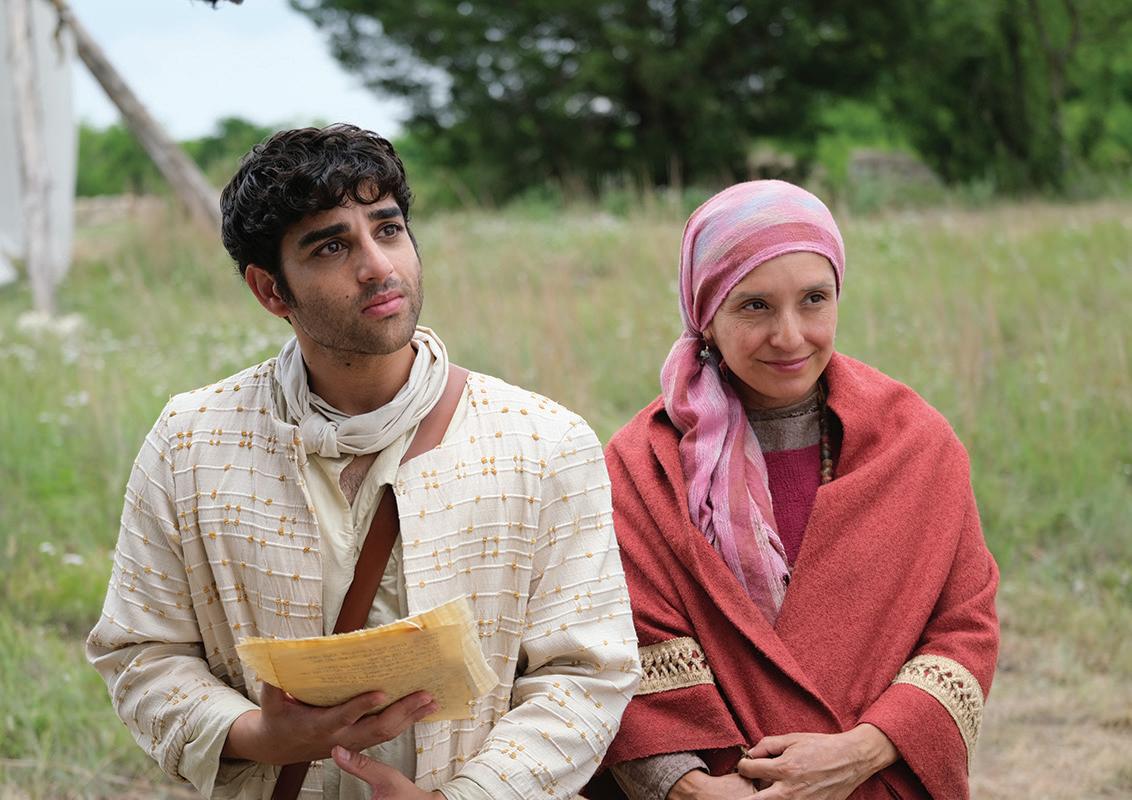THE CHOSEN PHENOMENON:

Creator Dallas Jenkins Goes Behind the Scenes of the Hit Series

BASEBALL’S DANSBY SWANSON Discovers His Identity Beyond The Game
THE VAN ZANT BROTHERS : Legends in Rock, Anchored in Faith ANN VOSKAMP’S Gratefulness Challenge


Creator Dallas Jenkins Goes Behind the Scenes of the Hit Series

BASEBALL’S DANSBY SWANSON Discovers His Identity Beyond The Game
THE VAN ZANT BROTHERS : Legends in Rock, Anchored in Faith ANN VOSKAMP’S Gratefulness Challenge



CELEBRATE FAITH, FAMILY, AND LOVE
WITH INSPIRING SONGS FROM COUNTRY MUSIC’S BIGGEST STARS INCLUDING:
Alan Jackson
Anne Wilson
Carrie Underwood
George
Jon Langston
Jordan Davis
Josh Turner
Mickey Guyton
Reba McEntire
The War and Treaty
Tyler Hubbard



Spring into a new season with Jesus Calling Books!
An exclusive excerpt from Sarah Young’s devotional
Gracious Lord,
Help me to hope for what I do not see—eagerly waiting for it with perseverance. Among the five senses, sight is the one I value the most. You created the world gloriously beautiful, and I delight in seeing the beauty of Your creation. However, I realize that hope, which is itself a kind of vision, is even more wonderful than sight. Hope enables me to see— through the eyes of my heart—things that are not yet. The most stunning example of this is the hope of heaven. Your Word tells me that my ultimate destination is to share in Your Glory! I can trust in this magnificent promise because it’s based on Your work on the cross and Your miraculous resurrection.
I need to practice hoping for things I do not see— both for this life and the next. Please guide me into hopes and dreams that are in line with Your will. I want to train the eyes of my heart to “see” these blessings while praying for Your will to be done fully and only. Teach me to wait eagerly with perseverance with my focus primarily on You but also on the longed-for outcome. You are my Hope!
In Your Great Name, Jesus, Amen




Dallas Jenkins and the Challenge of Portraying a True Life Story of Jesus


by Michael Overholt
I want you to make films and tell stories about Me.
That’s what Dallas Jenkins intuited one hot summer day while mowing the lawn. Like many, he used the quiet monotony of the task to pray, letting his thoughts and prayers blend into an unfiltered conversation with God. But this wasn’t just a casual check-in. Jenkins was at a crossroads. His most recent film, The Resurrection of Gavin Stone, flopped at the box office, and the failure was public, painful, and deeply disorienting.
Jenkins had wrestled with God because he wasn’t looking to give up on filmmaking. And he wasn’t afraid to be honest with God about his initial reaction to his previous thought.
“I don’t want to do that.”
If you know anything about Jenkins, this response makes sense. He didn’t just dislike most “Christian” films—he actively agreed with their critics. They often lacked nuance and ignored the messy realities of human life. “They’re so bad,” he told God. He had no desire to join the ranks of overly-sanitized, sugar-coated stories that left no room for doubt or struggle—i.e., the complexities of being a human.
Which is about the moment he sensed the

response that stopped him in his tracks: Well, make good ones.
From the very beginning of production for The Chosen, the popular series Jenkins created that follows Jesus and the people who followed Him in first-century Judea, telling an authentic story was the crew’s true north. They hung a large sheet of paper on the wall of their basement office with the word authentic scrawled across it. Creating a true, nuanced story that resonated with audiences wasn’t an abstract ideal but a boundary line. Every creative decision had to align so that the audience didn’t feel like they were watching a rote Sunday School story—the crew wanted the audience to feel like they were watching a complex, human story that came from Scripture. That meant if they were going to tell the story of Jesus, they’d tell it in a visual world that makes first-century Judea feel tangible to the viewer. “I’m focused on being as accurate to the history, to the culture, to the context, and to the person of Jesus as I possibly can,” Jenkins explains.
To maintain authenticity on The Chosen, Jenkins brought in a panel of theological and historical



advisors to review scripts, check cultural details, and ensure the customs, dress, and social dynamics are accurate. Jenkins’ goal isn’t to create a pretty backdrop—it’s to create a world that feels lived in. Costume fabrics are worn, stained, and rugged. Characters look like they’ve been walking dusty roads for days, not like they just stepped out of a Hollywood wardrobe trailer. The sets and architecture are tight, cramped homes and weathered stone walls. The dialogue reflects Jewish idioms and social customs that give depth to the characters’ words. Certain customs, like Sabbath observance, are featured prominently, not mentioned in passing.
The ripple effect of authenticity also impacts character development. Instead of presenting biblical figures as flat, sanitized archetypes, Jenkins’ team portrayed them as flawed, emotionally complex, and fully human. “In order to give you, the audience, the most truthful thing to watch, I only focus on the humanity of the person,” said Shahar Isaac, who plays Peter, “and allow myself to go to every direction that they are going.”
This was a radical shift from most portrayals of biblical figures. Characters like Peter and Mary Magdalene aren’t just inspirational figures—they are people with doubts, fears, and insecurities. Peter
is annoyed with Matthew. James and John are hottempered. The disciples argue, laugh, and make mistakes together. They aren’t perfect friends from the start. They’re human.
Relationships also had to pass the authenticity test, which meant portraying dynamics filled with tension, competition, and friction. Thus, Peter is visibly annoyed with Matthew’s social awkwardness. Mary Magdalene relapses into despair, even after she meets Jesus. And Peter’s relationship with his wife is given emotional depth. Every bond is tested, and the results feel human, not polished.
But with all the attention to detail that Jenkins and team have brought to their story, they’re mindful to admit that as they’ve told this story on screen, they’ve needed to fill in the gaps that Scripture creates. “I think it’s important to remember the difference between a TV show and the Bible,” says Jenkins. “As much as we love that this show points people to Jesus, it is just a show. Jonathan Roumie is not the real Jesus. I am not God, and the show is not the Bible.”
In other words, Jenkins and crew are not trying to replace the Bible. This is an important distinction to make, and one that comes with some risks. Read the reviews on YouTube clips from the film, and you’ll see how authentic filmmaking can stir the pot. In most Christian films, the disciples just obey. No hesitation. No doubt. No questions. But normal humans push back sometimes. And they argue—like Jenkins did with God while mowing his lawn.
One of the clearest examples of this is Peter casting his nets. In Scripture, Peter has one line of protest before agreeing. In The Chosen, we see this played out a bit more as we watch Peter hesitate, argue, and push back.” Peter is visibly tired, frustrated, and done fishing for the night. When he finally relents, his response is not simple obedience. It’s human exhaustion and surrender.
Peter is not the only example. Matthew is portrayed as a neurodivergent tax collector—socially awkward, hyper-focused, and often misunderstood. His choice to follow Jesus is a response to his growing isolation and loneliness.
“When developing Matthew into his character, I was wanting to be a light for the neurodivergent




community and let everyone feel like they have a space here and they belong,” said Paras Patel, who plays Matthew.
Jenkins adds, “To be able to experience the show as an example of putting a spotlight onto the Bible, a spotlight onto who Jesus was—to point people towards the real thing—is ultimately the goal of The Chosen and what I believe is the goal of Jesus Calling as well.”
The Chosen makes a point to take the story of Jesus out of the “kid‘s Sunday school” setting and move it into “historical drama.” As Jenkins likes to clarify, it’s a telling that dares to imagine what it felt like to follow Jesus as a human being in first century Judea, as a real, authentic person who felt pain, joy, and experienced humanity right along with us.


5&2 Studios will release The Chosen: Last Supper (Season 5) in theaters in the four weeks leading into Easter on March 27, 2025. All episodes of The Chosen: Last Supper will be released in three parts, bringing the most pivotal week in history to audiences in this special theatrical release.
For more information, please visit www.thechosen.tv


WITH THE GENTLE VOICE OF A TRUSTED FRIEND , author Ann Voskamp writes from her Canadian farm about what she calls a “wondrously messy, everyday-holy life.” For more than a decade, the author of One Thousand Gifts has dared readers to fully live right where they are, to bloom where God has planted them, no matter their season of life.
“
Something very sacred and intentional and beautiful is happening in the waiting.
Ann will be the first to say that seasons of waiting don’t make flourishing an easy task. Sometimes we’re waiting for God to show us a direction we should take. Sometimes we’re enduring a situation that is less than ideal. Other times we’re simply waiting for what’s going to happen next.
“No matter our season of life, there are things each of us has laid before the Lord in an open-handed posture of waiting,” she says. “Sometimes that waiting is with tears. Sometimes we’re tempted to clench our fists and say, ‘Lord, I desperately want the story to unfold this certain way. I’ve been waiting so long for this.’”
For Ann, the practice of counting gifts has opened the door to closer communion with God, even during these times of waiting. But her life has not been free from trouble and trials. Though the world knows Ann as a bestselling author, she admits that she is far
more acquainted with the art of waiting than the art of writing, and sometimes those periods of waiting can be painful. But she clings to this truth when the waiting feels overwhelming: “Jesus comes to love us in the midst of our suffering. He sees our suffering, and Jesus doesn’t sit still. It’s His love that rushes to hold our honest lament.”
When Ann met Jesus Calling author Sarah Young in 2015, she didn’t realize that Sarah’s life modeled the gifts that can come through waiting. Ann learned that Sarah, a missionary who had traveled to other countries to give of herself to others, was struggling with an illness that required her to become less active




and, in its worst moments, left her homebound. As Sarah waited for the healing she prayed would come, she journaled her prayers as she looked toward what God might have for her next. Those handwritten prayers would eventually become the Jesus Calling devotional. “Her whole life was truly about what it means to live worshiping the Lord in union and communion with Him,” Ann says. When it comes to waiting, Ann invites us to look beyond the drudgery and hopelessness that sometimes can accompany that season. “Something very sacred and intentional and beautiful is happening in the waiting,” she says. “Our hearts are being woven to the Lord. It’s like a three-legged race; our lives have been tied to the Lord so that we are walking with Him. When we wait on the Lord and our lives are being entwined in His, we’re actually being strengthened in God.”


You can find Ann’s latest book, Loved to Life, at your favorite book retailer.








The Jesus Calling® App is the easiest way to experience the inspiring words of peace and love from Sarah Young.





















Available on iPhone and Android, the Jesus Calling® App includes access to the Jesus Calling® Magazine, inspiring blogs, the weekly podcast, and more! We o er 3 pricing tiers—including a free option!




Get started today.


by Michael Overholt

HUMAN FASCINATION WITH CELEBRITIES can sometimes prompt a disregard for their ideas.
For example, Dansby Swanson, a Major League Baseball shortstop currently with the Chicago Cubs, firmly believes that “identity is supposed to be taken into what we do, as opposed to taking our identity from what we do.”
Sounds like a great Instagram caption, right? Something to shrug off as you think, Cute. Glad that worked out for you. You get paid to play baseball for a living. That’s not true for the average person who doesn’t have stadiums of people cheering them on.
But what if the opposite is actually true?
The more public a person’s life becomes, the more people feel entitled to tell them who they should be. Athletes, celebrities, and public figures aren’t just living for themselves—they’re performing for an audience with millions of opinions. And that can cause some serious anxiety.
Swanson’s no exception. For most of his life,

Swanson lived as if his identity came from his performance. When Georgia Tech didn’t see his playing potential, he had to deal with being rejected by his dream school. When his freshman year at Vanderbilt was riddled with injuries—foot surgery, shoulder surgery, and a deep cut on his finger from a fluke bad bounce—he had to choose whether to continue to play. And after he was drafted first overall in the MLB Draft, his performance-based identity really began to complicate his life.
The Arizona Diamondbacks selected him first overall and then, after one season in their minor league system, traded him that December to the Atlanta Braves. What could have looked like a homecoming story—the kid from Atlanta coming back to play for his hometown team—triggered feelings of inadequacy and rejection. If I’m being traded, that means I’m not good enough, he thought.
A performance-based identity can turn your dream come true into a nightmare. Swanson felt the
public pressure, expectations, and relentless selfdoubt. “Growing up, I definitely dealt with different forms of stress, but I never really knew what anxiety was like. I just got humbled, you know? Humbled down to my knees.”
The stress pushed Swanson to negative coping mechanisms. Without the tools to handle the mental strain, he reached for whatever was available to numb himself. He lived in a spiral of exhaustion and self-destruction, and his internal world was falling apart. The way he was handling his struggles wasn’t sustainable. “I was depressed. I wasn’t sleeping. I really wasn’t eating. I was probably drinking more than I should have been. I just wasn’t doing the right things,” he says.
Swanson turned to professional therapeutic help that was rooted in biblical principles. Every session was centered on Scripture and focused on Jesus as the anchor. For Swanson, this was the moment everything began to shift. He was no longer defined by the noise of the world, the fear of failure, or the expectations of others. He started to trust in God’s love rather than his own performance. “God does a lot of things through people for me, and I’m just so grateful that I’m able to keep that perspective, to just trust in Him and His plan.”
With this new clarity, prayer became essential.
“Prayer is a great way to stay present. When we’re present and in the moment, that’s when we really feel God’s peace and grace. And the more we stay and understand where our feet are, the better off we’ll be.”
He began spending time in reflection, centering himself before and after games. He also began using daily devotionals, like Jesus Calling, to realign his thoughts with Scripture. He developed a practice of being present, letting go of the constant fear of “what if” and embracing the moment he was in.
“Whether it’s in the morning or at night, whether it’s a daily devotional like Jesus Calling or a scripture you’re reading, spending time with God is a way to constantly recenter yourself into the right things.”
This shift in perspective redefined the way
Swanson thought about identity. No longer was his identity something baseball could give him—or take away from him. His identity was rooted in something deeper. “Our identity is secure in Christ and what He did for us. No matter how great we are, we’re still never going to be perfect.”
Swanson’s baseball career will end someday. Every player faces that moment. And for Swanson, the end won’t be a crisis. His identity will outlast his baseball career because his identity is rooted in something baseball could never give him.
As such, his belief that “our identity is supposed to be taken into what we do” is not just a feel-good quote, but a hard-won truth forged in the crucible of injuries, public pressure, and self-doubt. And that makes Swanson’s idea worth listening to.

This article has been adapted from the Jesus Calling Podcast
1. Start with a Devotional. Begin each morning with a devotional like Jesus Calling to center your mind on faith.
2. Pray to Stay Present. Use prayer to stay focused on the present moment, not past regrets or future anxieties.
3. Surrender Control to God. Let go of the need to control outcomes, and trust in God’s plan for your life.
4. Practice Gratitude and Reflection. End each day by reflecting on moments where God’s love was present.
5. Root Your Identity in Christ. Draw your identity from Christ, not performance, knowing your worth is already secure.

We hope you enjoyed this sample of the
To read the full version, please download the Jesus Calling App. There you can check out the entire issue – plus our complete archive.








REFLECT, REPENT, and PREPARE YOUR HEART for EASTER
Jesus Listens for Lent and Easter o ers daily prayers from Ash Wednesday through Easter Sunday. Spend this season of Lent in prayer as you remember Jesus’s love, sacri ce, and resurrection.
Available where books are sold
